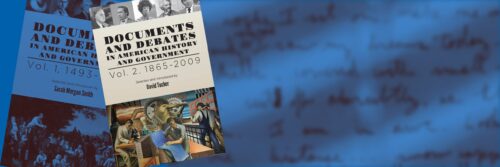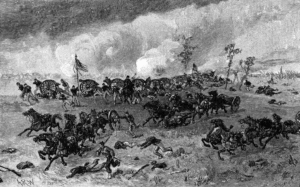
Under Construction: Merchants and Morality in Colonial Massachusetts
Almost every American can close their eyes and picture the scene. A small ship arrives off the coast of North America. Hearty pilgrims, armed with a covenant to follow all “good and just laws,” stagger ashore and begin building a new world. In the wilderness emerges a community of fiercely independent, rugged individualists who embraced unbridled capitalism. The colonists struggle to survive, but with the generous cooperation of the neighboring indigenous people, they conquer the initial obstacles nature put in their path. As more colonists arrive from the Old World, the colony begins to thrive.
Perhaps no other event in American history is more shrouded in myth than the Pilgrims’ settlement of Colonial Massachusetts. The reality is far more complicated than the simplified version Americans learn in elementary school and perform in Thanksgiving pageants. Still, in the documents from Teaching American History’s Documents and Debates, Vol. 1, Chapter 2: “Merchants and Morality in Colonial Massachusetts,” we see values that came to be known as characteristically American. These include honoring dissent in politics and religion, creating havens of religious freedom for all faiths, and balancing personal achievement with respect for the common good.
Last month, Teaching American History introduced a new tool for engaging students in controversies that animated earlier generations of Americans. Teaching American History developed its two-volume Documents and Debates collection to help teachers present the issues at stake in some of the most crucial moments in American history. We now supplement this accessible collection with a new tool: audio recordings of each chapter’s primary sources.
We the Teachers blog is featuring Documents and Debates with their accompanying audio recordings each month until all 29 chapters are complete. In today’s post, we feature Chapter Two: Merchants and Morality in Colonial Massachusetts from Documents and Debates, Volume 1: 1493 – 1865. Below is a list of documents in this chapter.
- Robert Cushman, The Sin and Danger of Self-Love, 1621
- William Bradford, Of Property, 1623
- John Winthrop, “A Model of Christian Charity,” 1630
- Passengers Bound for New England, March 20, 1635
- Admonishment and Reconciliation of Robert Keayne with the Church, 1639–1640
- Robert Keayne, Apologia, August 1, 1653
I was fortunate to take a course on Colonial America taught by the scholars who edited our Core Document Collection, David Tucker and Sarah Morgan Smith. We read many of the documents included in Merchants and Morality in Colonial Massachusetts. I had taught units on Colonial America for several years yet did not know that initially, all supplies and property in Plymouth were to be jointly held for seven years. Individuals were urged not to seek what was suitable for themselves. Instead, it was “the good of others that must be sought…” (Document A). By 1623, the colonists conceded that the experiment in collective ownership had failed, yet the collective sentiment that merchants were not permitted to profit unjustly from their commercial acumen remained. In 1630, Puritan leader John Winthrop urged future settlers to “knit more nearly together in the bonds of brotherly affection” and not merely from an emotional but also an economic perspective. In a land of scarcity, excessive concerns for protecting individual property might undermine efforts to build a New World: Winthrop advised settlers to be willing to freely lend from their resources as needed, as well as to be prepared to forgive debts in the name of mercy should the situation require. (Document C)
Many United States history teachers use Winthrop’s “A Model of Christian Charity,” if only to point students to his famous exhortation that the colonists “…must consider that we shall be as a city upon a hill.” (Document C) Examining Winthrop’s speech and the other documents in this chapter raises an interesting question. Exactly what kind of society was under construction in colonial Massachusetts in the mid-17th century, a godly commonwealth or commercial juggernaut? Is the answer: both? (Documents E and F)
We hope the documents in this chapter of Documents and Debates help you teach your students about Colonial America in greater depth. Since the 17th-century language in these documents challenges many students, we hope you can use our colleague Jeremy Gypton’s audio recordings to reach all the students in your classes.



